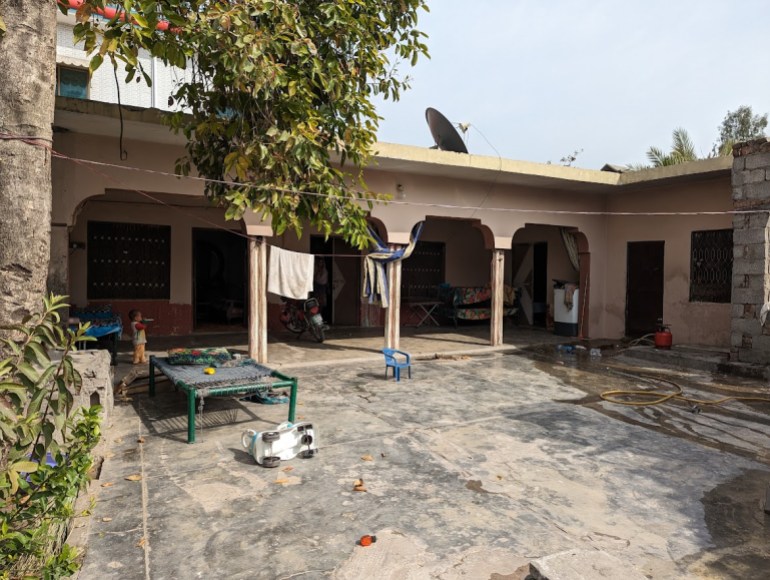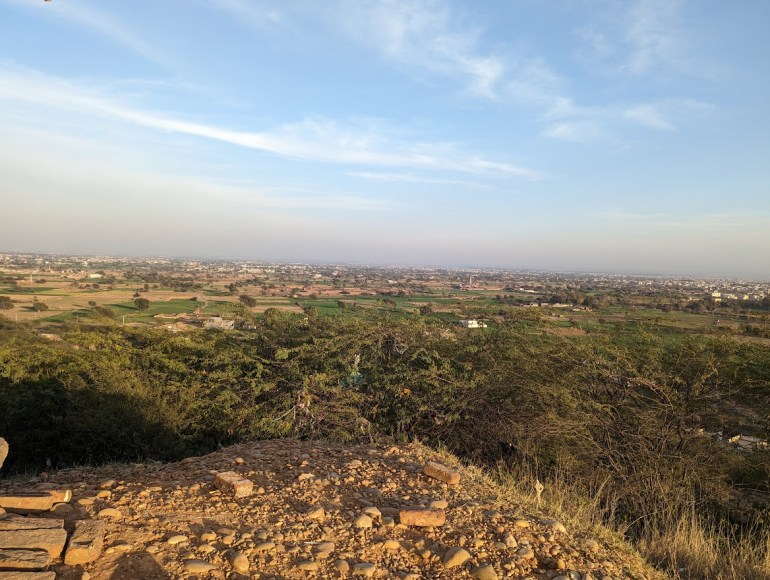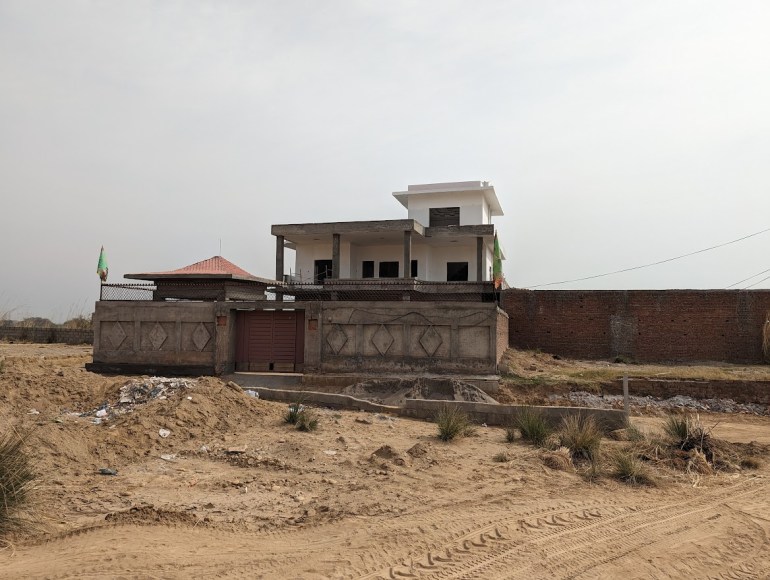The 42-year-old widow wears a large cotton dupatta, or shawl, draped over her head and shoulders as she walks past modest bungalows – most the same sandy brown colour as the earth, others painted blue or orange – and the occasional villa. These large, two- or three-storey villas stand behind gates and walls. Some have colourful mosaic tile work and black iron balconies, courtyards with palm trees or pruned gardens lined with jasmine and bougainvillea.
About 20 years ago, when Zubeida was a young mother with five children under the age of eight, she started working for a couple in their late 60s. They had moved from Bhatial to England in the late 1950s, a time when economic migrants were invited to rebuild the country’s post-war economy. After they retired in the early 2000s, they would return to the villa they built in Bhatial – one of several constructed by families who immigrated abroad – once a year for a few weeks during the winter. When they were there, Zubeida would work as domestic help for them – dusting, cooking, doing the laundry and washing up. The couple cared for her like a daughter, she says. Then, a little over a decade ago, they died.
Now, their children, who are in their 60s and early 70s and spend most of the year in the UK, own three imposing villas in the village, all constructed from imported marble and local bricks. Like their parents before them, they return in the winter, but their houses lay vacant for most of the year.
Zubeida cleans the three homes once a week – each on a different day. The closest is just five minutes away and the farthest, about 15.
“I go to these empty houses and sweep them from top to bottom using a jharhoo [a traditional brush made of dried grass] as it’s best for sweeping away dust,” she says. “I make sure everything is in order and then return to my own home.”
The quiet villas give her comfort in their solitude and stability, as solid structures anchored in the land, but they also sometimes make her think of a different life.
During the year, families of house sparrows and sometimes squirrels build homes in the crevices of these villas.
“Sometimes I look at these birds flying, and I think they don’t ever have to worry about money or worldly problems,” Zubeida reflects. “The world is theirs, and they can make anywhere their home.”
Zubeida’s own life is marked by uncertainty. She does not know where her home will be in the years to come because her eldest son’s family has largely taken over the house where she and her husband raised their children. As a widow, she worries about money, increasingly so as her health gets worse and the few basics she buys become harder to afford.

‘I salute them’
“If I spot a family of birds, I won’t disturb them,” Zubeida says.
“If they’ve managed to find a safe space to build their home in the corners of these empty castles, then I salute them,” she says. “After all, they live in these homes for much longer than the returning families ever do.”
A few days before the owners return, they will call Zubeida on her mobile phone to let her know they are coming. Then, she’ll do her usual sweep but will also dust the furniture, wash the linen by hand, make the beds and clean the bathrooms. That is when the birds must be moved along.
It is difficult for her to disturb the animals she has watched build their homes over the course of the year, so she carefully places the nests outside and then opens the windows and doors to try to encourage them to leave.
“This is harder than the physical work, but then I think, at least they were able to stay in the house for most of the year, and I know they will be back,” she says.
Sometimes her employers who flit between countries and cultures “remind me of migrating birds”, she comments, squinting in the sunlight.
When the families – usually the older owners with a daughter-in-law and grandchildren too young to go to school – return for two months in the winter, Zubeida works seven days a week for four to 12 hours a day.
She dusts, makes breakfasts of fried eggs or omelettes with paratha, freshly squeezed orange juice and chai, washes the dishes and then starts on the next meal. For lunch, she will often cook a vegetarian curry, a meat dish like kebabs and make fresh chappatis. In the afternoons, she buys any provisions that are needed and then returns to do the washing up.
“Because the families are visiting, they receive lots of visitors, so a big part of my work then becomes making potfuls of tea and serving them snacks,” Zubeida says, describing the samosas and pizzas she makes.
As she speaks, Zubeida walks slowly and carefully, never making sudden movements that could draw attention to herself. As a widow, she is wary of people and worries that her fellow villagers gossip about her, so she tries to be as inconspicuous as possible.

Widowhood
Every morning, Zubeida is woken at daybreak by a crowing rooster and a braying donkey that belong to her neighbours. “We can’t afford livestock of our own,” explains Zubeida, who lives with her youngest son, 21-year-old Zaghum.
Her comment catches the attention of an older man carrying firewood, and he stops to remind her that she did once own an animal – a cow, given to her and her husband, Khalil Ahmed, by one of the three families she works for.
Zubeida had forgotten. Her ownership had been short-lived, maybe a year, she recalls. She was forced to sell it in early 2017 when Khalil fell sick, and she needed to pay for his medical bills. She stayed by his bedside at the government hospital for three months. But Khalil did not make it. Zubeida still doesn’t know what the illness was that killed him.
She doesn’t often get the opportunity to talk about her late husband. They married young, she says, twisting the fabric of her navy dupatta and breaking into a rare smile.
When Zubeida was five years old, her mother died in childbirth. Her father remarried, but Zubeida’s stepmother beat her. Then, when she was seven years old, her stepmother made her stop going to school, so she could stay at home to cook and clean. Zubeida describes her marriage to her paternal cousin when she was 14 years old as a welcome escape from her childhood home. Khalil was 16. A year later, she gave birth to their first child, a daughter.
Khalil worked as a mistry, or labourer, on building sites and took on odd jobs as a handyman, gardener or baking bricks, working in one of the many kilns operating across Punjab. “My husband was hardworking. He would always find some way to earn a wage and look after us all,” Zubeida recalls.
When she was 25, Zubeida began to look for work and was introduced to the soon-to-be-retired couple by a neighbour. She took care of the woman, a kindly mother figure to Zubeida, and helped her take her medicine and navigate the marble house as she aged. “I would have done anything for her,” she says, her eyes welling up.
With her earnings, Zubeida and Khalil were slowly able to save and build a house of their own.
She would give cash to her husband to save in a committee – a traditional method of saving in which members deposit a set amount each month and one member receives the entire sum every rotation. Khalil built two rooms, a small kitchen, a pantry and a bathroom out of mud, then strengthened the house with cement.

‘They believe I’m bad news’
Khalil’s death brought on the financial worries that always linger at the back of Zubeida’s mind. But as a widow in her small village, she also faces the whispers of its residents, the stares of men and is avoided by families with girls.
“People stay away from me because I’m bewa [without husband],” she explains. “They believe I’m bad news, cursed in a way. The families from England don’t care, but here they do. They have a saying, ‘Havan ko kaagi hai [She’s eaten her husband.]’”
“I have to be very careful – who I speak to, how I speak to them. What time I come home, what roads I take,” Zubeida adds. “Women have always had to do this, but when you’re a widow, there’s an assumption that you must want another man.”
When the families visit and their guests stay late, she is required to work late, serving food and drinks and cleaning up afterwards. “I won’t walk home alone at night,” she says. Instead, she calls Zaghum to pick her up on his motorbike.
While walking along Bhatial’s unpaved side roads, Zubeida sucks on her cotton dupatta, which protects her from the dust and the stares of men.
“As a widow, I feel no respect and that people don’t care. I’m not sure what it’s like outside Pakistan,” she says.
“The more you are made to feel like you are a curse, the more you start believing it,” she reflects.

Poverty extends after death
The work that Zubeida does for the families is the only job she has ever known. She believes that as a widow, she would struggle to find work elsewhere – not that she would want to.
Her salary of 5,000 Pakistani rupees ($17) a month – which goes up to 30,000 rupees ($100) when the families return – and that of Zaghum, who earns 14,000 rupees ($49) from making tea at a real estate agency, only just cover their household costs. Despite this, Zubeida’s employers have always provided for her. She is confident that they will continue to – even in her old age – since she cared for their mother.
The families paid for her two daughters’ wedding expenses. They buy her clothes and appliances like a refrigerator and whatever else she may need although her needs are few and she lives frugally. She eats two meals a day – a paratha and maybe eggs for breakfast and aloo matar (potato and peas) or aubergine for dinner – and feels it is wasteful to spend money on herself. “I’ve never bought myself clothes or shoes,” she says.
She never asks for anything, and when her husband died, the burial was free, but a tombstone was not. She did not want to ask for help to pay for it.
Khalil was buried in an unmarked grave among engraved marble headstones in the village cemetery. “Everything costs money, even death,” she explains. “He didn’t want one anyway,” she adds quietly, referring to the tombstone that she could not afford. “But if I could, I would like something simple, just to say his name.”
Zubeida visits her husband’s grave every month to find peace, she says, and to share her hardships and triumphs.
She stops in the soft morning sun to remove some gravel from her worn-out flip-flops – one of two pairs of shoes that she owns.
Zubeida points to the acacia and rosewood trees lining the road she is walking along. “This,” she says, referring to the chirping birds in the trees, “is free to enjoy. Their songs make me happy, and I could listen to their conversations all day.”

‘Poor people don’t have friends’
After Khalil died, her eldest son, who works as a labourer, and his wife and child moved into Zubeida’s two-room home. She and Zaghum were pushed into a corner and now have only the pantry, where dry goods like lentils used to be stored.
The pantry has enough room for two mattresses. It is warm in the winter and stifling hot in the summer, but they can’t sleep in the courtyard because of the mosquitos.
They have limited interaction with the eldest son and his family despite living in the same house. Her middle son works in a hotel in Dubai and sends money home to his wife and child, who live in the daughter-in-law’s village in Pakistani-administered Kashmir. Neither son supports Zubeida and Zaghum. Zubeida rarely sees her daughters, who live in neighbouring villages, one about a 30-minute walk away, and are busy with their own families.
She is closest to Zaghum, who has been at the property company for a year now. “[He] is hoping it’s a way into the property business,” she says.
Despite being careful with money, Zubeida has felt the pinch over the past year when it comes to the food she can afford to cook for the two of them.
She used to prepare her youngest son’s favourite meal, lamb pilau, once a month, but with the cost of food going up, she can only do so once every two or three months. She can no longer afford her own favourite food, daal. When the families visit, she sometimes brings home leftover fruit or biscuits, which she would never buy herself.
She doesn’t have friends over, laughing at the thought.
“Don’t you know, poor people don’t have friends,” she says.

‘We’d never leave them empty’
These days, Zubeida’s health has become a concern. She has diabetes and must check her blood sugar levels each week at a clinic in the city of Jhelum. But with the price of motorised rickshaws tripling in the past 18 months, she has to wait until Zaghum is free to take her on his motorbike. Since a hysterectomy six years ago, she also has backaches and lower abdominal pain, she says, and simple tasks like sweeping now bring on a feeling of heaviness and at times, discomfort.
More recently, her right shoulder has been hurting.
“There’s a gap they’ve [her doctors] found there, and they say it’s from the sweeping and hard labour I do, … but I don’t know how to do anything else. This is my only form of income.”
She worries that, as a widow, if she had to find work elsewhere, she could be beaten or sexually abused by her new employers.
But she is also unsure about how much longer she can continue to work. “I’m not as strong as I was, even 10 years ago,” she confides, rubbing her lower back.
She has invested all her hopes in Zaghum.
“Today he’s a tea boy at the property company, but soon, he’ll move to the office, inshallah,” she says as she reaches the dirt road by the iron gate of the villa she will sweep today.
Guava and orange trees dot the grounds and balconies bulge from the second floor. The outside walls of the house are covered in grey, blue and mustard tiles.
“Then maybe,” she says with a wistful look, “we’ll be able to buy one of these fancy homes too. The difference is, we’d never leave them empty.”
